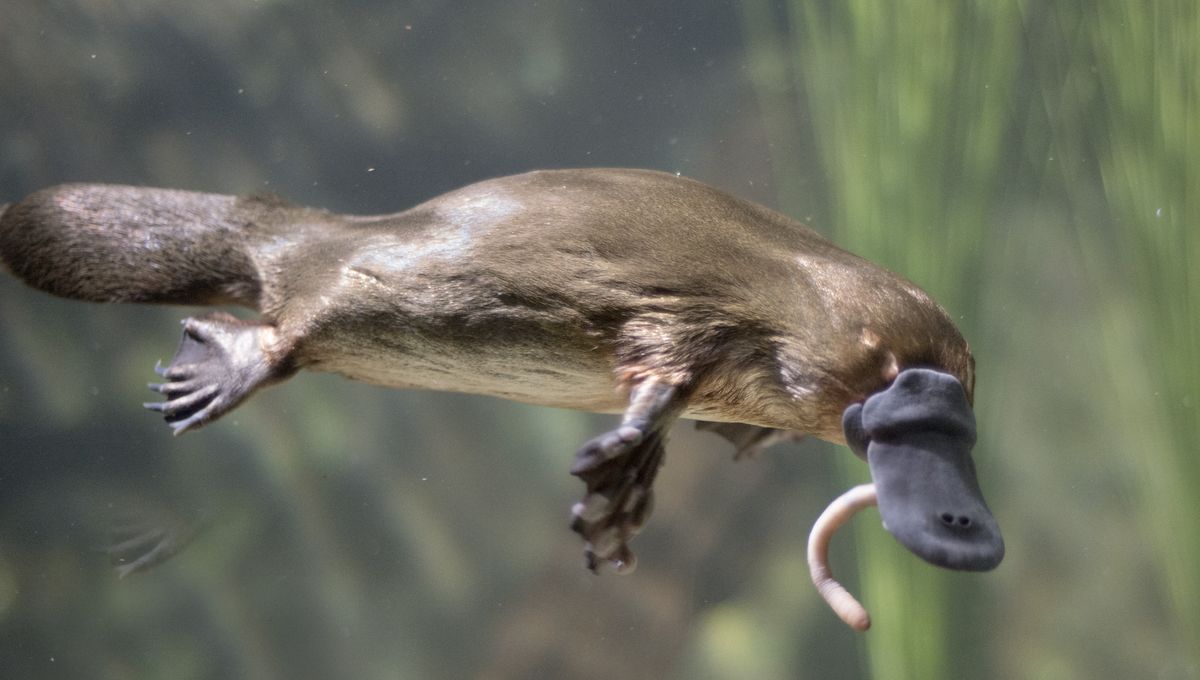
Did you know that platypuses are armed with a venomous spur on their hind legs? Well, one “Good Samaritan” found out the hard way when she was struck with excruciating pain while attempting to rescue a troubled platypus on the side of the road.
Jenny Forward, the unfortunate woman who was spurred by the platypus, described the pain as “worse than childbirth” and said it felt like her head “was gonna explode,” according to Australian breakfast TV show Sunrise.
The incident unfolded last week when Forward was driving near the town of Kingston on the Australian island of Tasmania.
After spotting a lone platypus in the road’s gutter, she pulled over and decided to help, fearing it had been run over by a car. However, the ungrateful platypus failed to see this gesture of goodwill. Upon picking up the tiny mammal, she felt an intense pain in her hand.
“I picked up this cute little wriggly platypus, next thing you know it twisted round [and] impaled both its spurs on either side of my right hand. I couldn’t actually get the platypus off my hand because it was stuck on there,” Forward told Sunrise.
“It was as though someone had stabbed [my hand] with a knife. The pain was excruciating… definitely worse than childbirth,” she added, speaking to ABC News.
Like many secluded islands, Australia has unique wildlife because it was isolated from the rest of the world for a relatively long time, allowing evolution to run riot in unlikely and wonderful ways.
The platypus is a prime example of this process. Native to eastern Australia, including Tasmania, this species of semi-aquatic mammal has a duck-like bill, a beaver-like tail, and otter-like feet. It’s so strange that European scientists first thought the animal was a hoax when pelts and drawings of it were sent back to Britain.
It is one of just five extant species of monotremes, mammals that lay eggs instead of giving birth to live young, along with four species of echidnas. Like other monotremes, the platypus uses electrolocation to navigate through murky water and hunt its prey, which includes worms, insect larvae, and freshwater shrimp.
It’s also, of course, one of the few mammals that can dispense venom to attack its foes. Both male and female platypuses are born with spurs on their hind legs, but only males can use it to dispense venom. It is capable of killing dogs and other similar-sized mammals, which are the kinds of animals that might cause problems for the creature.
The venom isn’t potent enough to kill a human, although it can eventually cause intense and lingering pain that can last a week. Medical case studies have highlighted how it’s extremely hard to treat people who have been stung by a platypus, especially because their venom has not been extensively studied.
A 1992 case report tells the story of a 57-year-old man in Australia who was struck by platypus venom while fishing in North Queensland, causing “immediate, sustained, and devastating” pain. The patient, who was a war veteran, described the pain as “much worse” than being hit by shrapnel in battle.
Upon arriving at the hospital after a 100-kilometer (62-mile) car ride, the victim was given morphine although it barely gave him any pain relief. Over the following days, his hand remained swollen and in pain, but he was eventually released from the hospital on day six after the pain became “tolerable.” He reported still being in some degree of pain over two weeks after the injury.
As for the recent case in Tasmania, the woman is reportedly still in some pain, but she’s starting to feel a bit brighter. Despite her highly unpleasant experience though, she hasn’t lost her passion for helping wildlife. In fact, the venomous incident has inspired her to help to protect platypuses, an increasingly rare species that’s becoming vulnerable to extinction.
“I’m definitely going to look at what the Kingborough Council is doing to protect them and maybe set up a small group to make sure our waterways are free of this awful litter that’s killing them,” Forward told ABC.
Source Link: Woman Stung By Platypus Venom Says Pain Was “Worse Than Childbirth”